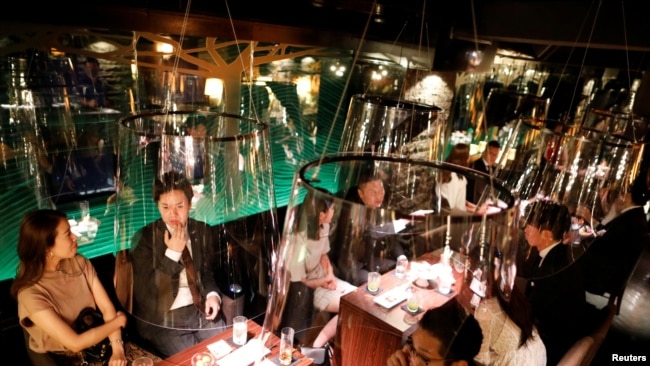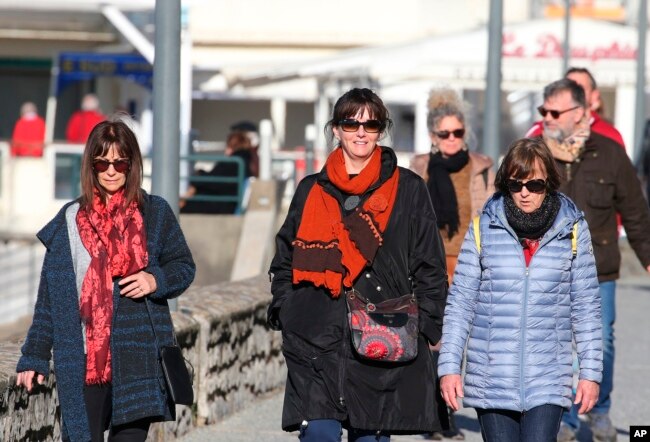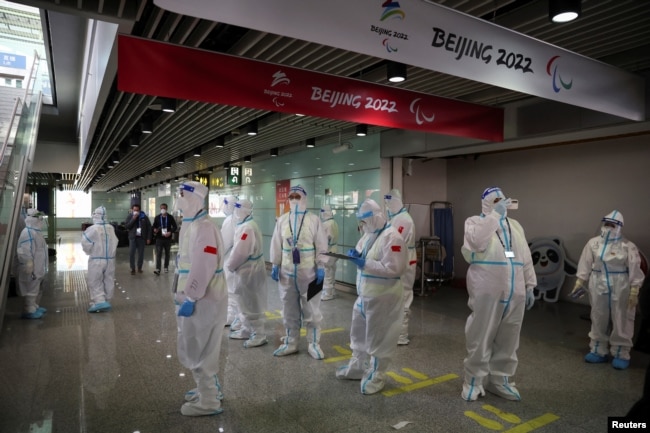“Now it’s time for us to take back our everyday life,”
誰もが叫びたい言葉です。
誰もが同じ思いです。
誰もがノー・モア・マスク、ノーモア・リストリクション!
好き嫌いに関わらず、しなければならないことはしなければならないのです!!
感情的になるべきではありません!!!
規制緩和の国々の措置が、世界を一巡し、廻り回ってまた次の亜種を引き連れ・・・・ENDLESS・・・CHAOU・・・
歴史書にはどのように記載されるのでしょう。
結末を決めるのは今、私たちの選択です。
あなたはどう思いますか?
COVIDの制限を緩和する国が増加(和訳)
More Countries Ease COVID Restrictions
February 02, 2022

Acrylic screens used as part of measures to prevent the spread of COVID-19 are installed at the Jazz Lounge Encounter, a night club in Tokyo, Japan.
東京のナイトクラブJazz Lounge Encounterに、COVID-19の拡散防止対策として使用されるアクリルスクリーンが設置されています。
コロナウイルスに大きな被害を受けた多くの国々で、COVID-19対策として、厳しく、しばしば不評な措置が緩和されつつあります。
ナイトクラブや映画館は再開されているます。特にヨーロッパと北米では、人々はもはや公共の場で顔を覆うもの、つまりマスクをつけていません。
関係者のオミクロンの波がピークを過ぎたという希望にともない、多くの国でCOVID-19の規制が徐々に緩和されつつあります。
感染力の強いオミクロン型は、過去10週間で、世界中で少なくとも9000万人の患者を出しました。これは、パンデミック初年度となる2020年の全症例を上回る数字です。
しかし、世界保健機関(WHO)は今週、一部の国がルールの緩和を検討できるようになったと発表しました。ワクチン接種率が高く、医療体制がしっかりしており、症例が悪い方向に向かっていない場合は、そうすることができるそうです。
何ヶ月もの間、パンデミックの中心地であった多くのヨーロッパ諸国の規制解除されつつります。オミクロンが最初に公表された南アフリカと米国では、規制が解除されつつあります。イギリスとアメリカでは、南アフリカと同様、オミクロンの患者数が当初は大幅に増加したが、現在は急速に減少しています。
米国では、地元の首長たちがさまざまな対応をしています。デンバー市は、学校や公共交通機関ではマスク着用ルールを維持する一方、企業や公共スペースでのマスク着用ルールを廃止する計画を発表しました。事例が落ちているニューヨーク州ではマスク義務化を緩和する動きがあり、裁判中です。
イギリス、フランス、アイルランド、オランダ、北欧の数カ国は、規制を終了または緩和する措置をとっています。ノルウェーやデンマークのように、患者数がまだ最高値に近いにもかかわらず、緩和が行われた国もあります。一部の政府は、単にパンデミックが減速していることを期待しているのです。
先週、イギリスはほとんどすべての制限を解除した。公共の場でのマスクは不要になり、公共スペースに入るためのワクチンも不要になりました。在宅勤務の命令も解除されました。しかし、陽性と判定された人はまだ隔離しなければなりません。
ノルウェーは火曜日、午後11時以降のアルコール提供の禁止と、10人以下の個人的な集まりの制限を解除しました。
「今こそ日常生活を取り戻す時だ」と、ノルウェーの保健大臣は火曜日に述べました。
COVID-19に関連する感染者は世界で3億7000万人以上、死亡者は560万人以上と報告されています。しかし、オミクロンの変種の広がりは多くの場所で鈍化し始めています。このため、インフルエンザのようにウイルスが流行しているが管理可能な新しい段階に入ろうとしているという希望が生まれつつあります。
オミクロンは、デルタ型よりも重症化しにくいことが分かっています。しかし、専門家は依然として、より危険な新型の可能性に警鐘を鳴らしています。
テドロス・アダノム・ゲイブレイスス氏はWHOの代表です。彼は火曜日、人々が感染拡大を防ぐことはもはや不可能であり、必要ないと考えていることを懸念していると述べました。
「真実から遠く離れたものはない 」と彼は言っています。
WHOの職員であるマイケル・ライアン氏は、政治的圧力によって一部の国が早々に開放を再開する可能性があると警告しています。
他の大陸では、非常に慎重な姿勢が続いています。世界で最もワクチン接種率が高いのはアジアです。そしてその指導者たちは、厳しいロックダウン措置を維持し、あるいはさらに制限を強めています。
北京冬季オリンピックを数日後に控えた中国は、ゼロCOVID政策を堅持しています。この政策では、感染者が発見された場合、直ちに厳格な閉鎖と隔離が行われます。また、公共交通機関ではマスク着用が義務付けられており、ほとんどのレストランや店舗に入るにはCOVIDフリーであることを証明する必要があります。
南アフリカは今週、オミクロンの波を乗り越えたと発表しました。調査によると、同国の免疫力は60〜80%とのことです。マスクはまだ必要ですが、学校は2020年3月以来初めて全面的に再開される予定です。
アティヤ・モサム氏は南アフリカ公衆衛生協会に所属しています。彼女は、このような措置は「感染がどのように起こるかを認識することの一部であり、一方で基本的なことです」と述べています。
More Countries Ease COVID Restrictions
Many countries hard-hit by the coronavirus are easing their strict and often unpopular measures to fight COVID-19.
Night clubs and movie theaters are reopening. People are no longer wearing face coverings, or masks, in public, especially in Europe and North America.
Slowly, many countries are easing their COVID-19 restrictions, as officials hope the Omicron wave has passed its peak.
The highly contagious Omicron variant has resulted in at least 90 million cases worldwide over the past 10 weeks. That is more than all cases in 2020, the pandemic’s first year.
But the World Health Organization (WHO) this week said some countries can now consider easing the rules. They can do so if they have high vaccination rates, their health care systems are strong and cases are not trending in the wrong direction.
Restrictions are being lifted in many European countries, for many months the world's center of the pandemic. Restrictions are being lifted in South Africa — where Omicron was first announced publicly — and the United States. In Britain and the U.S., like South Africa before them, Omicron cases greatly increased at first but are now coming down quickly.
In the U.S., local leaders have had many different responses. The city of Denver announced plans to end its mask rules for businesses and public spaces, while keeping them for schools and public transportation. A move to ease a mask mandate in New York state, where cases have fallen, is in the courts.
England, France, Ireland, the Netherlands and several Nordic countries have taken steps to end or ease their restrictions. In some places, like Norway and Denmark, the easing comes even though case counts are still near their highs. Some governments are simply hoping that the pandemic is slowing.
Last week, England ended almost all restrictions. Masks are not required in public and vaccines are no longer needed to get into public spaces. The work-from-home order has also been lifted. However, those who test positive still have to isolate.
On Tuesday, Norway lifted its ban on serving alcohol after 11 p.m. and the limit on private gatherings of no more than 10 people.
“Now it’s time for us to take back our everyday life,” Norway's Health Minister said Tuesday.
More than 370 million cases and over 5.6 million deaths linked to COVID-19 have been reported worldwide. But the spread of the Omicron variant is beginning to slow in many places. It is giving rise to the hope that the pandemic is about to enter a new stage in which the virus, like the flu, is endemic but manageable.
Omicron has shown to be less likely to cause severe illness than the Delta variant. But experts are still warning about the possibility of a new, more dangerous variant.
Tedros Adhanom Gheybreysus is the head of WHO. He said Tuesday that he is concerned that people think preventing the spread is no longer possible or necessary.
“Nothing could be further from the truth,” he said.
WHO official, Michael Ryan, warned that political pressure could lead some countries to open back up too soon.
Other continents are continuing to be very careful. Some of the world’s highest vaccination rates are in Asia. And its leaders are keeping their strict lockdown measures or making them even more restrictive.
Just days ahead of the Beijing Winter Olympics, China is holding on to its zero-COVID policy. It imposes strict lockdowns and quarantines quickly when any cases are found. There are also mask mandates for public transportation, and people must prove they are COVID-free to enter most restaurants and stores.
South Africa this week announced that it has moved past the Omicron wave. Studies show immunity in the country is between 60 and 80 percent. Masks are still required, but schools will reopen fully for the first time since March 2020.
Atiya Mosam is with the Public Health Association of South Africa. She said such steps are part of recognizing “how transmission occurs, while basically balancing people’s need to live their lives.”
Words in This Story
strict — adj. used to describe a command, rule, etc., that must be obeyed
variant — adj. different in some way from others of the same kind
trend —n. a general direction of change : a way of behaving, proceeding, etc., that is developing and becoming more common
mandate — n. an official order to do something
isolate — v. to put or keep in a place or situation that is separate from others
endemic — adj. growing or existing in a certain place or region
quarantine — n. the period of time during which a person or animal that has a disease or that might have a disease is kept away from others to prevent the disease from spreading
transmission — n. the act or process by which something is spread or passed from one person or thing to another

